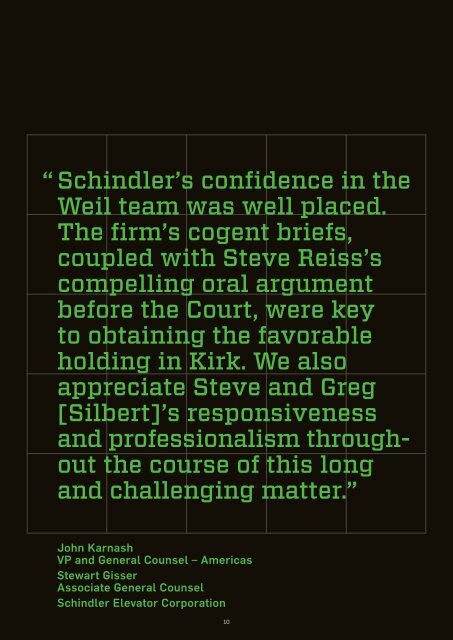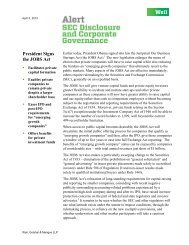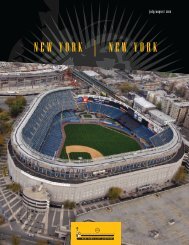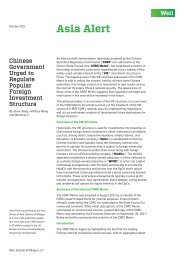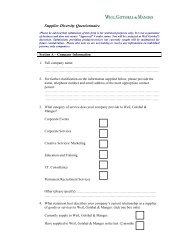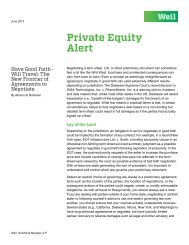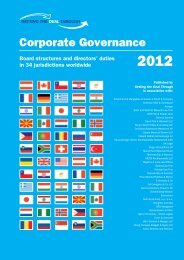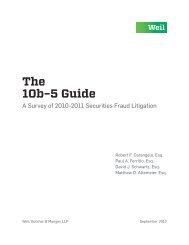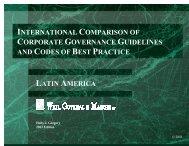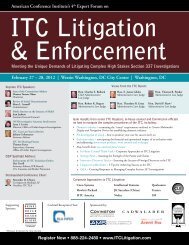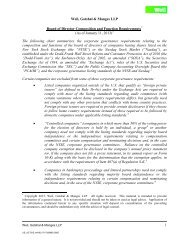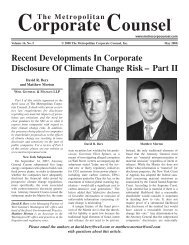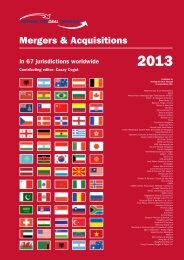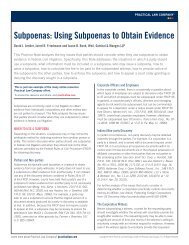Download PDF - Weil, Gotshal & Manges
Download PDF - Weil, Gotshal & Manges
Download PDF - Weil, Gotshal & Manges
Create successful ePaper yourself
Turn your PDF publications into a flip-book with our unique Google optimized e-Paper software.
“ Schindler’s confidence in the<br />
<strong>Weil</strong> team was well placed.<br />
The firm’s cogent briefs,<br />
coupled with Steve Reiss’s<br />
compelling oral argument<br />
before the Court, were key<br />
to obtaining the favorable<br />
holding in Kirk. We also<br />
appreciate Steve and Greg<br />
[Silbert]’s responsiveness<br />
and professionalism throughout<br />
the course of this long<br />
and challenging matter.”<br />
John Karnash<br />
VP and General Counsel – Americas<br />
Stewart Gisser<br />
Associate General Counsel<br />
Schindler Elevator Corporation<br />
Schindler Elevator<br />
Corporation<br />
Client: Schindler Elevator Corporation<br />
Date: May 16, 2011<br />
Case & Venue: Schindler Elevator Corporation v.<br />
United States ex rel. Daniel Kirk (US Supreme Ct.)<br />
Practice Groups: Appellate, Complex Commercial<br />
Litigation<br />
<strong>Weil</strong> Team: Partner Steven Reiss in New York,<br />
counsel Gregory Silbert in New York and Lisa<br />
Eskow in Houston, and associates David Yolkut,<br />
Adam Banks, and Kami Lizarraga in New York<br />
<strong>Weil</strong> won an important victory in the US Supreme<br />
Court for Schindler Elevator Corporation in a<br />
case interpreting the public-disclosure bar of<br />
the False Claims Act (FCA). The case was<br />
closely watched by the business community and<br />
was of considerable importance to companies<br />
that do business with and receive payments<br />
from the federal government.<br />
A disgruntled former employee brought a qui<br />
tam action – a suit brought by a private plaintiff<br />
on behalf of the federal government – claiming<br />
that Schindler had failed to properly report to<br />
the government the number of veterans it employs,<br />
as is required of federal contractors, and that<br />
Schindler was therefore liable for all sums it<br />
had been paid by the federal government, trebled.<br />
The plaintiff based his claim on information he<br />
received through Freedom of Information Act<br />
(FOIA) requests he submitted to the Labor<br />
Department, asking for Schindler’s filings.<br />
Schindler moved to dismiss the complaint,<br />
arguing that the suit was based on publicly<br />
disclosed information and therefore precluded by<br />
the FCA’s public-disclosure bar. The district court<br />
agreed and dismissed the suit, but the Second<br />
Circuit reversed, holding that responses to FOIA<br />
requests do not trigger the public-disclosure bar.<br />
The Supreme Court reversed the Second Circuit,<br />
holding that the public-disclosure bar – an<br />
important and frequently litigated shield against<br />
meritless FCA actions – applies to qui tam actions<br />
based on FOIA responses. Following the decision,<br />
the Second Circuit sent surviving claims in the<br />
case back to the trial court.<br />
CBS Corporation<br />
Client: CBS Corporation<br />
Dates: May 24, 2011 (district court ruling);<br />
May 10, 2012 (appellate ruling)<br />
Case & Venue: City of Omaha v. CBS Corp.,<br />
No. 08-10816 (S.D.N.Y.), No. 11-2575 (2nd Cir.)<br />
Practice Groups: Appellate, Complex Commercial<br />
Litigation, Securities Litigation<br />
<strong>Weil</strong> Team: Partners James Quinn, Greg Danilow<br />
and Yehudah Buchweitz, counsel Gregory Silbert,<br />
and associate Kimberly Rosensteel in New York<br />
<strong>Weil</strong> won complete dismissal of a federal<br />
securities class action against CBS Corp., Chief<br />
Executive Leslie Moonves, Chairman Sumner<br />
Redstone, and two former officers of the company<br />
in May 2011, when the Southern District of New<br />
York granted our motion to dismiss and noted<br />
that the plaintiffs, for a second time, had failed<br />
to allege a plausible securities fraud claim.<br />
The original complaint, filed in 2008 by the<br />
City of Omaha and two retirement plans<br />
covering former city and Nebraska state<br />
employees purportedly on behalf of a class of<br />
CBS shareholders, alleged that CBS delayed<br />
taking a $14 billion impairment charge in order<br />
to keep its stock price artificially inflated so as<br />
to not trigger certain alleged undisclosed loan<br />
covenants. The court dismissed the plaintiffs’<br />
claims in March 2010, holding that they failed<br />
to plead scienter with sufficient particularity<br />
required by the Private Securities Litigation<br />
Reform Act (PSLRA) and that the plaintiffs failed<br />
to allege anything that would have required<br />
CBS to take an impairment earlier than it did<br />
under the relevant accounting rules. The court<br />
later granted the plaintiffs leave to amend their<br />
complaint, which CBS moved to dismiss.<br />
In May 2011, Judge P. Kevin Castel found that<br />
the plaintiffs’ amended complaint suffered<br />
from the same core weaknesses as the original<br />
complaint. The plaintiffs appealed that decision<br />
to the Second Circuit, and in May 2012 the<br />
appellate court affirmed “for substantially the<br />
reasons stated in the district court’s thoughtful<br />
and thorough opinions.” The Second Circuit<br />
held that “the asserted basis for plaintiffs’<br />
securities fraud claims is quite limited[]” and<br />
that the amended complaint “is devoid even of<br />
conclusory allegations that defendants did not<br />
believe in their statements of opinion regarding<br />
CBS’s goodwill at the time they made them.”<br />
10<br />
11


